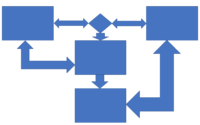
Eco-dialogical learning and translanguaging in open-ended 3D virtual learning environments: Where place, time, and objects matter
The purpose of this research was to explore the relationships between design, learning, and translanguaging in a 3D collaborative virtual learning environment for adolescent learners of Chinese and English. We designed an open-ended space congruent with ecological and dialogical perspectives on second language acquisition. In such a space, sense-making is contingent on the relational dynamics […]















